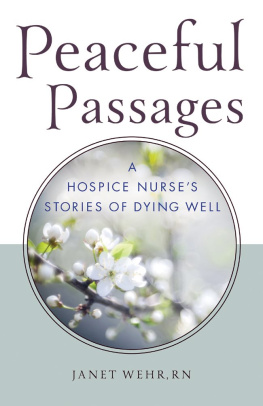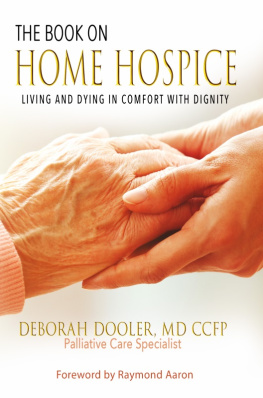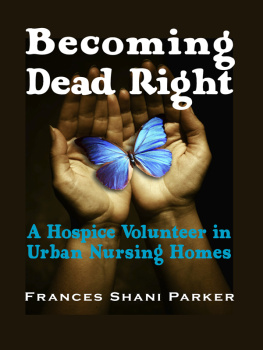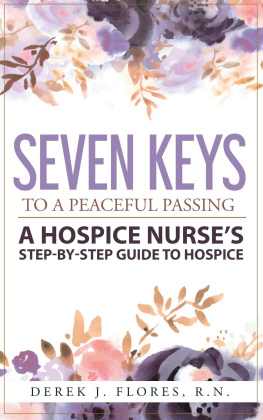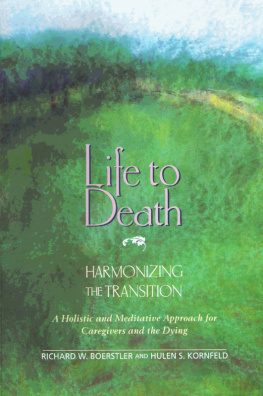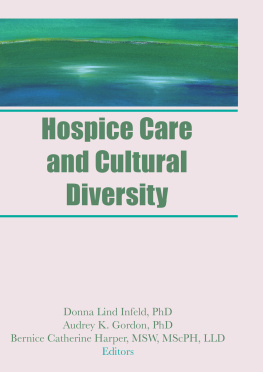I wish to acknowledge two experienced and generously willing teachers who helped to shape my hospice career. Both of these gentle but strong women truly walked the walk, both in their hospice role and in their lives outside that role.
Beverly Spaulding, who had worked as a hospice nurse long before this fledgling nurse came along, took it upon herself to mentor me with all she had gleaned along the way in her practice, much of which had to do, not with book learning, but with the exquisite treasure of her experience. Mary Brooks, hospice social worker extraordinaire (and the best in the land!), taught me the gentle art of when to speak and when to listen and, most importantly, how to make the distinction with ones heart. Mary was also the very first person to read my book manuscript and to coax me persistently to publish it.
To these women, and to countless other people with whom I have walked the hospice path, I thank you for all you have given me.
Namast.
Introduction
Why Hospice? Or, How the Peaceful Passages Book Came to Be
W hy hospice? This is the first question I have learned to expect when Im asked about what kind of nursing I practice. This same question has come from family members, friends, strangers, and nurses and doctors who practice in other areas of the medical field. In most areas of healthcare, saving a life is the focus, and death is often viewed as a failure. Historically, there has not been a great deal of understanding as to why people would choose to concentrate their efforts where a medical success is not likely. Believe me when I say that it required a monumental shift in thinking for me to switch gears from the type of nursing I had previously done, which had everything to do with fixing, saving, and curing. I had to find out for myself that what we do in hospice is every bit as important, except that its for people who no longer have those treatment options.
But arent you sad all the time? or, Isnt it scary? or, Dont you cry a lot? are other frequently asked questions. Those of us working in hospice will answer: No, Im not sad all of the time. No, it isnt scary. Yes, I cry a lot. But the crying is often from the relief, joy, and satisfaction that a patients last weeks, days, or hours were fulfilling and comfortable, and that their family members had been able to work toward this same goal in a positive way.
Our training to provide symptom management, comfort, and teaching, as well as our ability to foster support and ease in the dying process, has value beyond compare to the patients and families who experience this situation firsthand and often for the first time. In a way, hospice staff can be thought of as midwives during the labor of dying: we are there to teach, support, and guide, without interfering in the process or in the experience that is taking place for patients and their families.
At one point, early in my career, I began to doubt my ability to do this work. I wonde red to myself: What qualifies me to assist people through their dying experiences, through what is probably the single most important event in their lives since birth?
During the time that I was wrestling with these questions, I was assigned a patient, Mary Kay, who was exactly my age and who had three children in their early twenties, the same ages as my own children. At times, our lives were so parallel that I felt as if I were looking in a mirror. Mary Kays children were her primary caregivers during her time in hospice.
One day, as I got out of my car to go into Mary Kays home for a nursing visit, Mary Kays neighbor was backing out of her driveway. She stopped her car beside me, rolled down her window, and said, Are you Janet? I nodded and saw big tears roll down her cheeks.
Do you know how much you mean to them? she asked, pointing to Mary Kays house. Do you know that they wait by the windows and the front door for you every day because they rely on your support and expertise so much? Do you know that you do what the rest of us are unable to do because were afraid? Thank you, Janet.
Well, there was the answer to the question I had been grappling with, in triplicate: we do hospice care because we can, because were called to do it, and because we make a difference.
I should make the distinction here that the members of the hospice team are really only the people behind the scenes. I say this because, with teaching and support, the families and caregivers of our patients actually facilitate the most important parts of care during dying. Ive witnessed the tender things family members do to ease a patients suffering while they guide them toward death with love and compassion; the way they impeccably feed them and keep them clean and comfortable; and the way they nurture the mind, the body, and the spirit of their dying loved one. Ive seen them tuck beloved items into their hands, or under their blankets, to bring them joy. Ive seen them climb into the patients hospital bed with them, at their own discomfort, to give them the gift of physical closeness. Ive seen them lovingly give a patient their permission to go, bravely telling them that theyll be okay, even as they doubt the words theyre saying because their hearts are missing them already. Those of us working in hospice are the facilitators, but the husbands, wives, children, grandchildren and friends are what hospice is all about.

